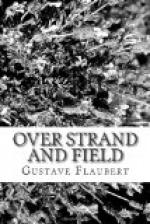After passing over large pieces of rock that have been placed in the sea in order to shorten the route by cutting the back of the bay in two, we finally arrived at Plouharnel.
The village was quiet; chickens cackled and scratched in the streets, and in the gardens enclosed by stone walls, weeds and oats grew side by side.
While we were sitting in front of the host’s door, an old beggar passed us. He was as red as a lobster, dirty and unkempt and covered with rags and vermin. The sun shone on his dilapidated garments and on his purple skin; it was almost black and seemed to transude blood. He kept bellowing in a terrible voice, while beating a tattoo on the door of a neighbouring house.
CHAPTER VI.
QUIMPER.
Quimper, although it is the centre of the real Brittany, is distinctly different from it. The elm-tree promenade that follows the winding river, which has quays and boats, renders the town very pretty and the big Hotel de la Prefecture, which alone covers the little western delta, gives it a thoroughly administrative and French appearance. You are aware that you are in the chef-lieu of a department, a fact brought home to you by the latter’s division in arrondissements, with their large, medium, and small parishes, its committee of primary instruction, its saving banks, its town council and other modern inventions, which rob the cities of local colour, dear to the heart of the innocent tourist.
With all due deference to the people who pronounce the name of Quimper-Corentin as the synonyme of all that is ridiculous and provincial, it is a most delightful place, and well worth other more respected ones. You will not, it is true, find the charms and riotous wealth of colouring possessed by Quimperle; still, I know of few things that can equal the charming appearance of that alley following the edge of the river and shaded by the escarpment of a neighbouring mountain, which casts the dark shadows of its luxuriant foliage over it.
It does not take long to go through cities of this kind, and to know their most intimate recesses, and sometimes one stumbles across places that stay one’s steps and fill one’s heart with gladness.
Small cities, like small apartments, seem warmer and cosier to live in. But keep this illusion! There are more draughts in such apartments than in a palace, and a city of this kind is more deadly monotonous than the desert.
Returning to the hotel by one of those paths we dearly love, that rises and falls and winds, sometimes through a field, sometimes through grass and brambles, sometimes along a wall, which are filled in turn with daisies, pebbles and thistles, a path made for light thoughts and bantering conversation,—returning, I said, to the city, we heard cries and plaintive wails issue from under the slated roof of a square building. It was the slaughter-house.




